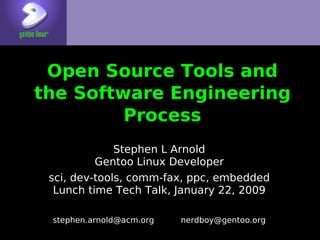Open Source Tools and the Software Engineering Process
- 1. Open Source Tools and the Software Engineering Process Stephen L Arnold Gentoo Linux Developer sci, dev-tools, comm-fax, ppc, embedded Lunch time Tech Talk, January 22, 2009 stephen.arnold@acm.org nerdboy@gentoo.org
- 2. What Tools? • Emulators and interface tools • Configuration / document management • Text processing – from sed to python • Documentation and XML tools • Reverse engineering and design analysis • Static and dynamic code analysis/profiling • Compilers, libraries, development environments • Modeling, workflow, and process support
- 3. Basic Analysis Process • Review/pre-process and configure source • Plan branch/tag strategy in advance • Checkouts start with head/trunk • Run metrics and documentation tools • Review stats and metrics for required language tools and potential problem areas • Use doxygen to extract design information • Define a project • Use your favorite editor, IDE, or Eclipse • Run static analysis tools (add stubs and instrument code as needed) • Determine build/runtime dependencies
- 4. Software CM Tools • Many open source tools available: CVS, SVN, Monotone, and more • Excellent integration with other tools • Editors, IDEs, etc • Web interfaces, project management • Other SCM tools • Use the tool capabilities to perform: • Process support • Basic anaylses • Peer review • Status reporting
- 5. Source Code Processing Stand-alone text-mode tools for statistics, metrics, and documentation • Easy to run and automate • Can produce voluminous output • Statistics and metrics • SLOCCount – line counts for multiple languages, project statistics • CCCC – Statistics and several software metrics • Documentation and design extraction • Doxygen – Source code (API) documentation, software design and structure diagrams (many output formats) • Robodoc, JavaDoc, other
- 6. Projects and Artifacts • Editor or IDE? Use what works best... • emacs/Xemacs, vi(m), kate, other • Eclipse, Anjuta, Jdeveloper, Source Navigator, other • Analyze developer project files • Know what they build against • Define your own project • Source, header files • Toolchain and build system • Required libraries • Document the architecture and interfaces • Compare to design artifacts • Annotate source code
- 7. Static Analysis Tools Variety of tools to choose from depending on source language: • Command-line tools, GUI tools, Eclipse plugins • Lint-style tools for Fortran, C, C++, etc • ftnchek, splint, cppcheck • Can incorporate in Makefiles, build hosts • GUI tools • Stand-alone, eg, Grasp, or plugins for existing development platforms • Eclipse (and other) plugins • Analysis – PMD, Findbugs, Jlint, CppChecker • Modeling – GMF, TOPCASED • Metrics, Visualization, Testing, Profiling, more...
- 8. Example Java Analysis Example: Eclipse with Java code • Configure, count, and document code • SVN w/ apache, viewvc, trac, mod_auth_* • Doxygen, SLOCCount, CCCC • Create project • Eclipse Ganymede release with full JDT • Sun JDK 1.6, PMD, and FindBugs • Import sources, add libraries • Analyze build errors and any project artifacts • Add any additional libs/packages, repeat • Configure and run analysis tools • Analyze results and adjust as needed • Add annotations, modify analysis rules, create reports
- 9. Resources • Statistics and metrics • SLOCCount - http://www.dwheeler.com/sloccount/ • CCCC - http://cccc.sourceforge.net/ • Documentation and design extraction • Doxygen - http://www.stack.nl/~dimitri/doxygen/ • JavaDoc - http://java.sun.com/j2se/javadoc/ • Eclipse - http://www.eclipse.org • Plugins - http://www.eclipseplugincentral.com • TOPCASED - http://www.topcased.org • Software engineering tools at tigris.org • Subversion, clients, plugins • ArgoUML (supports DoDAF notation)
- 10. This work is an original work by Stephen L Arnold <nerdboy@gentoo.org> <http://dev.gentoo.org/~nerdboy> Portions copyright 2009 Stephen L Arnold. Some rights reserved. The Gentoo Linux logo is Copyright 2004 Gentoo Foundation, used with permission. This work is licensed under the Creative Commons Attribution- NonCommercial-ShareAlike License. To view a copy of this license, visit <http://creativecommons.org/licenses/by-nc-sa/1.0> or send a letter to Creative Commons, 559 Nathan Abbott Way, Stanford, California 94305, USA. Please contact Stephen L Arnold <stephen.arnold@acm.org> for commercial uses of this work.










